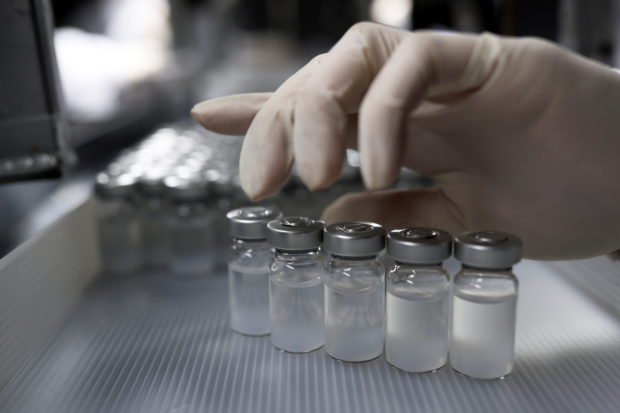MANILA, Philippines — Aside from possibly finding COVID-19 vaccines that would fit a particular age group, the head of the country’s health research unit said there is also a need to specify which vaccines can be stored easily in consideration of conditions in the countryside.
During the Laging Handa briefing on Monday, Philippine Council for Health Research and Development executive director Dr. Jaime Montoya explained why the Philippines must join the World Health Organization (WHO) solidarity trials despite using a wide array of vials already.
According to Montoya, storing vaccines, especially the mRNA versions, has become a challenge due to the need to maintain low temperatures to ensure its effectiveness — which is not a knock on the available vials, but more of a problem in maintaining the required temperature.
“Patuloy pa rin po ang pag-aaral, ang mga clinical trials. Bakit po? Kasi hindi pa po nakikita ‘yong ideal vaccine na gusto natin talagang mangyari. Halimbawa, ito pong mga vaccines natin ngayon, bagamat epektibo katulad no’ng Pfizer, ‘yong mga mRNA vaccines, kailangan po i-store ito na medyo mababa no, ‘yong minus 70 degrees (Celsius). Mahirap po i-maintain ‘yan,” he said.
(Studies have continued, along with clinical trials. Why? Because we have not found the ideal vaccine that we want and need. For example, we need to store these vaccines that we use, even if they are effective like Pfizer and the mRNA vaccines, at a low temperature of negative 70 degrees Celsius. That’s hard to maintain.)
“So naghahanap pa po tayo ng mga equally effective vaccines na siguro po ang transport requirement at storage requirement ay hindi ganoon katulad no’ng sa mRNA,” he added.
(So we are looking for equally effective vaccines which, maybe, would have transport requirements at storage requirements that are not as difficult to comply with like in the case of mRNA vaccines.)
Montoya explained that two vaccines are currently being used for the solidarity trials — a protein subunit vaccine and a DNA-based version — aiming to immunize at least 15,000 individuals to obtain enough data.
Two more brands are expected to be added, including an mRNA vaccine similar to Pfizer and Moderna, which only requires one dose for full vaccine coverage, and a slightly warmer temperature. The other vaccine is an intranasal version, or immunizing through the nose.
“‘Yong DNA vaccine kauna-unahan po ‘yan, at ‘yong dalawang planong isama pa po at maybe in the next few months ay ito pong intranasal — sa ilong po natin ibibigay — at ‘yong ika-apat ‘yong mRNA vaccine pero single dose lang po at ‘yong kanyang storage condition na required ay mas maganda kumpara sa mga ginagamit na ngayon,” Montoya explained.
(The DNA vaccines are a first, and the two other vials we plan to include maybe in the next few months are an intranasal version, administered through the nose, and another mRNA vaccine, but it’s a single dose and requires a slightly warmer storage condition.)
“So mas mataas po, minus-20 (degrees Celsius) lang po or even higher, so tumitingin pa po talaga tayo ng mga kakaibang plataporma ng bakuna dahil maaaring mas better pa po ito sa mga available nang bakuna,” he added.
(It’s higher, it only requires around minus-20 degrees Celsius or maybe even higher, so we are looking for other platforms for vaccines because they may be better suited for us compared to available brands.)
Last Friday, Dr. Marissa Alejandria of the University of the Philippines College of Medicine and president of the Philippine Society for Microbiology and Infectious Diseases said they have already enrolled 5,000 participants for the solidarity trials.
Project lead Dr. Jodor Lim said that people in areas with lower vaccination rates, like outside Metro Manila, will be urged to participate. However, only those at least 16 years old who have not received any COVID-19 vaccine and have not tested positive for COVID-19 through a laboratory test are eligible.
After vaccination, patients would be evaluated and monitored every week for a year to observe if the participants would trigger any symptoms.
READ: 5,000 participants so far enrolled in COVID-19 vax solidarity trial
COVID-19 cases in the country have seen a downward trend recently, with the Department of Health only recording 203 new cases, while 395 new recoveries pushed the active infection count down to 9,729.
However, experts have warned about a possible surge if health protocols against COVID-19 are ignored, especially with the Omicron variant, which is 4.2 times more infectious than the already transmissible Delta variant detected in three travelers.
READ: Philippines detects third case of Omicron coronavirus variant
